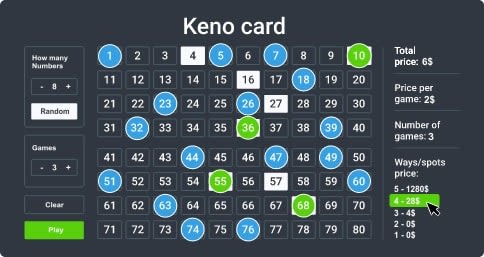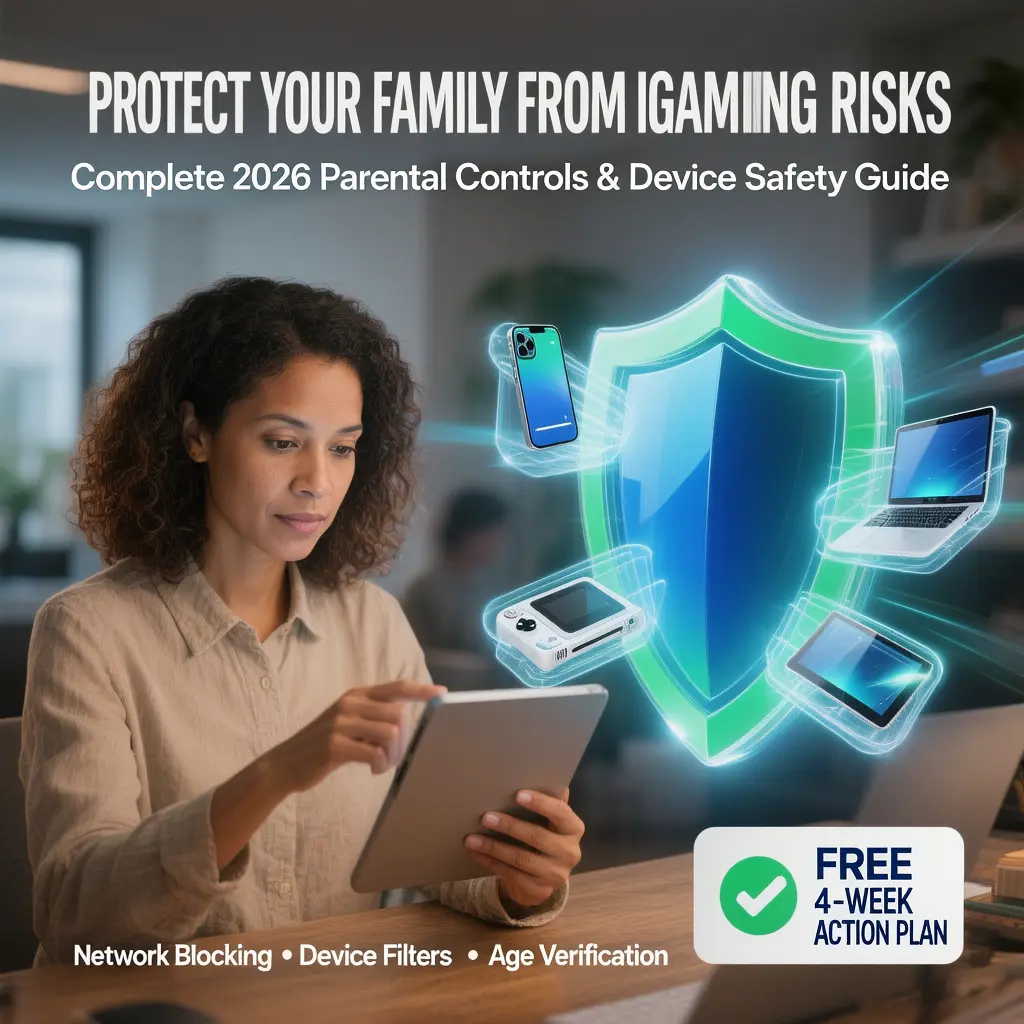The digital world offers endless entertainment, but it also hides risks, especially for children. Recent studies reveal an alarming trend: a significant number of teenagers are being exposed to online gambling.
In the UK, 9.1% of 18-24 year-olds are classified as problem gamblers, and in the US, studies show 14-19% of high schoolers exhibit problematic behavior.
This isn’t just a statistic it’s a call to action for every parent. This guide is your comprehensive manual for iGaming safety, providing practical steps for setting up gaming parental controls, implementing robust device filters, and creating a multi-layered strategy for underage gambling prevention. Let’s build a safer digital playground for our families.

Understanding the Underage iGaming Threat Landscape
The accessibility of online gambling has grown exponentially, and children are more exposed than ever. They can stumble upon iGaming sites through misleading ads, social media influencers, or even by searching for free-to-play games. The psychological impact on a developing brain can be severe, as the instant gratification loops in gambling games are highly addictive. For families, the risks are not just emotional but also financial, with potential for unauthorized credit card charges and debt. Effective underage gambling prevention requires understanding these threats to properly protect children from gambling.

Why Traditional Content Filters Aren’t Enough
Many parents rely on basic browser settings or standard safe browsing filters, but these are often insufficient. Tech-savvy kids can easily bypass them using VPNs or proxy servers. Furthermore, the mobile app ecosystem presents a huge challenge. Many “social casino” games, which don’t use real money but mimic casino mechanics like slots, are readily available on app stores and can act as a gateway to real gambling. True internet safety requires a more robust approach than simple filters.
Legal Responsibilities and Parental Liability
As a parent or guardian, you hold legal and financial responsibility for your child’s online activities. The legal gambling age varies by jurisdiction, but it’s almost universally 18 or 21. If a minor uses your credit card to gamble online, you could be liable for the debt. This is why account supervision and parental consent are critical. Operators are required by law to enforce these age limits, but the first line of defense starts at home. Understanding these legal guidelines is a key part of family digital safety.
| Jurisdiction | Typical Legal Gambling Age |
|---|---|
| United Kingdom | 18+ |
| United States (most states) | 21+ (18+ for some lotteries/bingo) |
| Canada (most provinces) | 19+ (18+ in Alberta, Manitoba, Quebec) |
| Australia | 18+ |
| European Union (varies) | 18+ (some countries 21+) |
Essential Gaming Parental Controls: Platform-by-Platform Guide
The most direct way to manage your child’s digital environment is by using the built-in gaming parental controls on their devices. These tools allow you to restrict content, limit screen time, and monitor activity. Here’s how to set up parental controls on the most common platforms.
Windows Family Safety Settings
Microsoft’s Family Safety suite is a powerful tool for any Windows PC. By creating a family group with your Microsoft accounts, you can enable robust device filters and monitor your child’s activity. Key features include:
- Content Filtering: Block specific websites and apps, or limit access to age-appropriate content only.
- Activity Reporting: Receive weekly email reports detailing your child’s screen time, web browsing, and app usage.
- Spending Controls: Require your approval for any purchases from the Microsoft Store, preventing unauthorized game or credit purchases.
These family settings provide excellent account supervision and are a great starting point for PC-based protection.

The Windows Family Safety dashboard gives parents a clear overview of their child’s digital activity.
macOS and iOS Screen Time Controls
Apple devices have powerful, integrated controls called Screen Time. This feature goes beyond simple timers and offers granular control over what your child can do. It’s one of the most effective parental control apps for online gambling prevention built right into the OS.
- Content & Privacy Restrictions: Block adult websites automatically and add specific gambling-related URLs to a “never allow” list.
- App Limits: Set daily time limits for specific app categories, like “Games,” or for individual apps.
- Downtime: Schedule blocks of time when only approved apps and phone calls are available.
Properly configured, Screen Time is a fantastic tool for device safety for gambling on iPhones and iPads.
Android Digital Wellbeing and Family Link
Google’s solution for parental controls online gaming is a combination of Digital Wellbeing and the Family Link app. Family Link allows you to create a supervised Google account for your child and manage it from your own device.
- Google Play Store Restrictions: Approve or block apps your child wants to download and set content ratings.
- Activity Monitoring: See how much time your child spends in their favorite apps.
- Set Time Limits: Lock the device when it’s time for a break, like at bedtime or during homework hours.
This system provides strong family device management for the Android ecosystem.

Google Family Link offers remote supervision of your child’s Android device.
Gaming Console Protections (PlayStation, Xbox, Nintendo)
Modern gaming consoles have built-in web browsers and stores, making them potential gateways to iGaming. It’s crucial to set up parental controls for gaming consoles.
- PlayStation: Use “Family Management” to set monthly spending limits, restrict access to the browser, and filter games by age rating.
- Xbox: The “Xbox Family Settings” app lets you manage everything from your phone, including screen time, purchase approvals, and content filters.
- Nintendo Switch: The dedicated “Nintendo Switch Parental Controls” app is excellent for setting play-time limits and restricting online features.
Implementing these device restriction settings is a vital step in setting up device filters for iGaming.
Network-Level Protection: How to Block Casino Sites on Home Network
While device-level controls are great, a determined child might find a way around them or use a friend’s device. The next layer of defense is to block casino sites on your home network itself. This method blocks access for any device connected to your Wi-Fi.
Router Configuration for Gambling Site Blocking
Most modern Wi-Fi routers have built-in parental controls. By logging into your router’s admin panel (usually by typing an IP address like 192.168.1.1 into your browser), you can access these features. Look for sections like “Content Filtering” or “Parental Controls.” Here, you can often block websites by category (e.g., “Gambling”) or manually add specific URLs to a blacklist. This creates a basic network firewall against unwanted content.
DNS-Level Filtering Solutions
For more powerful and comprehensive protection, consider using a DNS filtering service. DNS (Domain Name System) is like the internet’s phonebook; it translates a website name (like anilgnews.com) into an IP address. By changing your router’s DNS settings to a family-safe provider, you can block entire categories of harmful content before they even load. This is a highly effective gambling site blocker.
Popular and easy-to-use services include:
- OpenDNS FamilyShield: Pre-configured to block adult content. Simply change your router’s DNS settings to 208.67.222.123 and 208.67.220.123.
- CleanBrowsing: Offers a free Family Filter that blocks adult content, proxies, and VPNs.
- Cloudflare for Families: Use their “Malware and Adult Content” blocker by setting your DNS to 1.1.1.3 and 1.0.0.3.
This DNS filtering approach is one of the best ways to how to block casino sites on home network because it covers every device automatically.

DNS filtering acts as a gatekeeper, blocking access to harmful sites at the network level.
ISP-Provided Parental Control Services
Many Internet Service Providers (ISPs) like Comcast (Xfinity), AT&T, and Virgin Media offer their own parental control services. These are often free with your subscription and can be activated through your account portal. They provide an easy way to manage family internet safety by filtering content across your home network, though they may be less customizable than third-party DNS solutions.
Third-Party Parental Control Apps for Online Gambling Prevention
For the ultimate layer of device-specific protection, specialized parental control apps for online gambling offer features that go far beyond built-in OS tools. These apps provide deep monitoring, real-time alerts, and robust filtering that is harder to bypass.
Comprehensive Software Comparison
Choosing the right app can be tough. Here is a comparison of some of the top options available in 2025, focusing on their effectiveness for underage account blocking and gambling prevention.
| App Name | Gambling Blocking | Price (Approx. Annually) | Devices Supported | Key Features | Rating |
|---|---|---|---|---|---|
| Qustodio | Excellent (Category & URL) | $55 | iOS, Android, Windows, macOS | Detailed activity logs, time limits, real-time alerts. | 4.5/5 |
| Norton Family | Good (Category-based) | $50 | iOS, Android, Windows | Web supervision, location tracking, safe search. | 4.0/5 |
| Kaspersky Safe Kids | Good (Category & URL) | $15 | iOS, Android, Windows, macOS | App blocking, GPS tracking, social media monitoring. | 4.2/5 |
| Net Nanny | Excellent (Real-time analysis) | $55 | iOS, Android, Windows, macOS | Contextual content filtering, screen time management. | 4.3/5 |
| Bark | Good (Alert-based) | $99 | iOS, Android | Monitors texts/social media for signs of risk (including gambling talk). | 4.6/5 |
Installation and Configuration Best Practices
To make these apps effective, follow this device filter setup guide:
- Install in Order: Set up network-level filters first, then device-level OS controls, and finally the third-party app. This creates redundant protection.
- Secure with a Password: Always protect the app’s settings with a strong administrator password that your child does not know.
- Customize Filters: Don’t just rely on the “Gambling” category. Manually add URLs of popular local betting sites to the blocklist.
Mobile-Specific Protection Apps
Mobile devices require special attention. Apps like Qustodio and Net Nanny are excellent for both iOS and Android. They can block app installations from unknown sources (on Android) and use location tracking to alert you if your child is near a physical casino or betting shop, adding another layer to your family device management strategy.
Age Verification Systems: How Operators Protect Underage Users
The responsibility for underage gambling prevention also lies heavily with the operators. Licensed online casinos and sportsbooks are required by regulators like the MGA and UKGC to implement strict age verification systems. Understanding these age verification best practices helps you identify safe, compliant sites.
Document-Based Verification Methods
The most common method is Know Your Customer (KYC). This is a multi-step process to confirm a player’s identity and age.
- Document Scan: Users must upload a photo of a government-issued ID (passport, driver’s license).
- Biometric Matching: The system uses facial recognition to match the person in a live selfie to the photo on the ID.
- Liveness Detection: The user is asked to perform an action (like blinking or turning their head) to prove they are a live person and not just holding up a photo.

Modern KYC combines document scans with biometric checks for robust age verification.
Alternative Verification Techniques
Operators often use a combination of age verification methods for a layered approach. This can include checking a user’s details against third-party credit and public databases, or using mobile network data to help confirm an identity. Some new systems even use AI-powered facial age estimation as an initial screening tool.
Red Flags: Weak Verification Systems to Avoid
A major warning sign of an unsafe, unlicensed site is a weak or non-existent verification process. If a casino lets you deposit and play without asking for any ID, it is not compliant and should be avoided. True licensing transparency means an operator is proud to show they follow the rules. These sites pose a huge risk for underage gambling prevention.
Financial Controls: Preventing Unauthorized Transactions
One of the most direct ways to prevent underage access to gambling is by controlling the flow of money. Many parents overlook the powerful financial tools at their disposal.
Credit Card and Banking Controls
Your bank can be a strong ally. Many banking apps now allow you to block transactions based on the merchant’s category code. You can often find a setting to block all “Gambling” transactions. Additionally, setting up transaction alerts for your cards will notify you instantly of any suspicious charges. Using prepaid cards for your child’s spending instead of a direct credit/debit card also adds a layer of safety, as they have a fixed, limited balance.
Digital Payment Platform Settings
Platforms like PayPal, Apple Pay, and Google Pay have their own parental control features. You can set up child accounts that require your approval for every transaction. It’s also crucial to secure your own digital wallets with strong passwords and biometric locks to prevent unauthorized use. Monitoring gift card purchases is also important, as they can be used as an anonymous way to fund gambling accounts.
Monitoring Financial Warning Signs
Regularly review your bank and credit card statements for any unexplained charges or transactions with unfamiliar merchant names. Look for small, repeated charges, as these can be a sign of in-app purchases or small deposits. If you find charges you don’t recognize, contact your bank and the operator immediately. This diligent account monitoring is a key part of your defense.
Education and Communication: The Human Firewall
Technology is a powerful tool, but it’s not foolproof. The strongest defense is an open, honest conversation with your children. These education resources and communication strategies are just as important as any app or filter.
Age-Appropriate Conversations About Gambling Risks
How you talk to your kids about gambling should change as they grow.
- Ages 6-10: Focus on the basics of money and the difference between games of skill and games of chance. Explain that gambling means risking money you could lose.
- Ages 11-14: Discuss the odds and the concept of the house edge. Explain that casinos are businesses designed to make money. Use loot boxes and in-game microtransactions as relatable examples of gambling-like mechanics.
- Ages 15-17: Talk about addiction, peer pressure, and the legal consequences of underage gambling. Encourage critical thinking about the ads they see online.
These conversations are a core part of being a responsible gaming for parents advocate.
Creating a Family Digital Safety Agreement
A family media agreement is a written set of rules for technology use that everyone agrees to. It sets clear expectations and consequences. Your agreement should cover:
- Daily screen time limits.
- Rules for downloading new apps (e.g., must ask for permission).
- A “no-secrets” policy about online activity.
- Spending rules for online games.
This formalizes your family settings and makes everyone accountable.
Recognizing Warning Signs of Underage Gambling
Be aware of behavioral changes that could signal a problem. These include becoming secretive about their device use, asking for money frequently or having unexplained cash, a sudden drop in grades, or withdrawing from friends and hobbies. These warning alerts should prompt a gentle but direct conversation.
What to Do If Your Child Has Been Gambling Online
Discovering your child has been gambling can be shocking and stressful. How you respond is critical. This is a crucial part of underage gambling prevention that is often overlooked.
Immediate Action Steps
- Stay Calm: Approach the conversation with concern, not anger. Your goal is to understand, not to punish.
- Document Everything: Take screenshots of the app or website, transaction histories, and any communications.
- Secure Accounts: Immediately change passwords on all affected financial accounts and digital wallets.
- Contact the Operator: Inform the gambling operator that a minor has used their service. Licensed operators are required to close the account and refund deposits.
- Assess the Damage: Review your financial statements to understand the full extent of the spending.
Professional Support Resources
You are not alone. There are many organizations that provide free, confidential help for families dealing with youth gambling.
Need Help? If you or someone you know has a gambling problem, help is available. Call or text the National Problem Gambling Helpline at 1-800-GAMBLER or visit the National Council on Problem Gambling (NCPG) website at www.ncpgambling.org. Youth-specific resources like Gam-Anon can also provide support for families.
Long-Term Recovery and Prevention
The discovery can be a learning moment. Use it to teach financial literacy and rebuild trust through open communication. Implement the multi-layered protection plan discussed in this guide to prevent a relapse. If the behavior continues, seeking family therapy or professional counseling is a sign of strength.
Multi-Layered Security: Combining Strategies for Maximum Protection
No single tool is a silver bullet. The most effective strategy for underage gambling prevention is a defense-in-depth approach that combines network-level blocking, device-level controls, and human-level education. This creates a system of comprehensive protection.
The Three-Tier Protection Model
Think of your defense in three layers:
- Layer 1: Network (The Moat): Use router settings and DNS filtering to block gambling sites for every device on your home Wi-Fi.
- Layer 2: Device (The Walls): Use built-in OS controls and third-party parental control apps to manage specific devices, especially mobile phones that leave the home network.
- Layer 3: Human (The Guards): This is you. Education, open communication, and active monitoring are the most important and adaptable layers of defense.
Testing and Maintenance Schedule
Your protection system needs regular check-ups. Create a simple maintenance schedule:
- Monthly: Test your filters by trying to access a known gambling site. Review activity logs.
- Quarterly: Review app permissions and update parental control settings.
- Annually: Change key passwords and have a family meeting to review your digital safety agreement.
Adapting Controls as Children Mature
Your parental controls should evolve with your child. As they get older, you can gradually loosen restrictions, transitioning from a model of control to one of trust and guidance. The goal is to equip them with the critical thinking skills to make safe choices on their own when they become adults.
International Best Practices and Regulatory Frameworks
The push for iGaming safety is a global movement. Regulators worldwide are implementing strict rules that operators must follow. For example, the UK Gambling Commission (UKGC) has some of the toughest age verification best practices in the world, while new markets like Brazil are building robust protections into their licensing from day one. This global pressure ensures that licensed operators are held to a high standard of policy enforcement.
Operator Obligations: What Licensed Sites Must Do
Licensed operators are legally required to:
- Perform mandatory, robust age verification on all new players.
- Provide easy-to-use responsible gambling tools, including self-exclusion.
- Adhere to strict marketing rules that forbid targeting minors.
- Ensure their licensing transparency by displaying their license information clearly.
Reporting Non-Compliant Operators
If you come across a site that you suspect is unlicensed or is targeting minors, you should report it. You can usually find the contact information for the relevant regulatory body (like the UKGC or your state’s gaming commission) online. Reporting these sites helps protect other families and holds bad actors accountable.
Future-Proofing: Emerging Technologies and Threats
The digital world never stands still. As parents, we need to be aware of emerging technologies and the new risks they might present. This is a forward-looking part of our gaming parental controls guide.
Cryptocurrency and Blockchain Gambling Risks
The rise of cryptocurrency presents new challenges for underage gambling prevention. The anonymous nature of some crypto transactions can make it harder to track spending and verify age. It’s important to have conversations with your children about the risks of these decentralized platforms and secure any crypto wallets you may own.
AI and Machine Learning Protection Tools
On the bright side, technology also brings new solutions. As we saw at events like G2E 2025, AI is being used to develop smarter parental controls. Future parental control apps for online gambling will use behavioral analysis to detect patterns of gambling activity in real-time and send instant warning alerts to parents, offering predictive rather than reactive protection.
Practical Action Plan: Implementing Protection Today
Feeling overwhelmed? Don’t be. Here is a simple, four-week action plan to set up parental controls and secure your family’s digital life.
1: Network-Level Setup
- Days 1-2: Access your router’s admin panel and enable any built-in content filtering.
- Days 3-4: Implement a DNS filtering service like OpenDNS FamilyShield. This is a powerful step to how to block casino sites on home network.
- Days 5-7: Test your filters to ensure they are working correctly.
2: Device-Level Configuration
- Set up OS-level controls (Screen Time, Family Link) on all your children’s devices.
- Install and configure a third-party parental control app for mobile devices.
- Document all your passwords in a secure location.
3: Education and Communication
- Schedule a family meeting to discuss digital safety.
- Work together to create and sign a Family Digital Safety Agreement.
- Have age-appropriate conversations about the risks of online gambling.
4: Monitoring and Optimization
- Establish a routine for checking activity logs and financial statements.
- Fine-tune your filter sensitivity based on the reports.
- Create a calendar reminder for your quarterly and annual maintenance checks.
Frequently Asked Questions
Can my teenager bypass parental controls?
Yes, determined teens can often find workarounds like VPNs or using a friend’s device. This is why the multi-layered approach, especially the “human firewall” of open communication and education, is so important. Network-level DNS filtering that blocks proxies and VPNs can also help.
Do parental controls slow down internet speed?
Generally, no. Modern parental control apps and DNS filtering services are highly optimized and have a negligible impact on your internet speed. You are unlikely to notice any difference in performance.
What’s the best free option for gambling site blocking?
Using a free DNS filtering service like OpenDNS FamilyShield or Cloudflare for Families on your router is the most effective free option. It blocks access for every device on your network automatically.
How do I explain controls to my child without damaging trust?
Frame it as a safety issue, not a punishment. Compare it to a seatbelt in a car—it’s there to protect them from unexpected dangers. Involve them in creating a Family Digital Safety Agreement so they feel part of the process.
Are social casino apps dangerous even without real money?
Yes, they can be. They use the same psychological hooks and reward systems as real-money gambling, which can normalize gambling behaviors and act as a gateway for minors. It’s wise to block or limit these as well.
Can I monitor without invading privacy?
It’s a balance. Focus on transparency. Let your child know that you will be reviewing activity logs as part of your family’s safety plan. The goal is supervision, not spying. Apps like Bark focus on alerting you to specific dangers rather than giving you access to every message, which can be a good compromise.
What if my child uses a friend’s device?
This is where education is key. Your child needs to understand the risks and have the confidence to say no, even when you’re not around. This is a limitation of technology that only communication can solve.
Do I need different controls for gaming vs. gambling?
Yes. General gaming can be managed with time limits, while gambling sites and apps should be blocked entirely. Your controls should distinguish between playing a game for fun and accessing a platform that involves financial risk.
How often should I update my settings?
Review your settings quarterly. The digital landscape changes quickly, and your child’s needs will change as they mature. A quick check-in every few months ensures your protections remain effective.
What are the signs of gambling addiction in teens?
Warning signs include an obsessive interest in gambling, lying about their activities, borrowing or stealing money, a decline in school performance, and withdrawing from family and friends. If you see these signs, it’s important to seek professional help.
Conclusion: Continuous Protection Requires Continuous Effort
Protecting your family from the risks of underage gambling is not a one-time setup. It’s an ongoing commitment that blends technology with trust. By implementing a multi-layered defense of network filters, robust gaming parental controls, and, most importantly, open communication, you create a resilient safety net. The goal of underage gambling prevention is not to eliminate technology, but to ensure our children can navigate the digital world safely and responsibly. Start with one step from the action plan today. Your effort is the best investment you can make in your family’s digital well-being.
With over 20 years of experience in the iGaming industry, Anilgnews provides expert analysis and in-depth content to help players and operators navigate the complexities of online gambling regulation. Contact Here For Paid Collaborations anilguptadm12@gmail.com.





